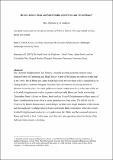Files in this item
Hume and Smith studies after Forbes and Trevor-Roper
Item metadata
| dc.contributor.author | Skjoensberg, Max Simon | |
| dc.date.accessioned | 2018-10-25T10:30:05Z | |
| dc.date.available | 2018-10-25T10:30:05Z | |
| dc.date.issued | 2018-10-04 | |
| dc.identifier | 255867610 | |
| dc.identifier | 453843e4-ebb6-4bbc-bc96-e7723d977406 | |
| dc.identifier | 85058473424 | |
| dc.identifier | 000560914700010 | |
| dc.identifier.citation | Skjoensberg , M S 2018 , ' Hume and Smith studies after Forbes and Trevor-Roper ' , European Journal of Political Theory , vol. Online First . https://doi.org/10.1177/1474885118798928 | en |
| dc.identifier.issn | 1474-8851 | |
| dc.identifier.uri | https://hdl.handle.net/10023/16322 | |
| dc.description.abstract | The ‘Scottish Enlightenment’ has fostered a steadily growing academic industry since Duncan Forbes and Hugh Trevor-Roper put the subject on the map in the 1960s. David Hume and Adam Smith have from the start been widely considered as its leading thinkers, and their thoughts on politics have attracted an increasing amount of attention in recent years. Two new publications invite readers to reflect on the state of the art in Scottish Enlightenment studies in general, and especially Hume and Smith scholarship. Christopher Berry’s Essays on Hume, Smith and the Scottish Enlightenment collects many of Berry’s pathbreaking essays from a career spanning over 40 years. The Infidel and the Professor by Dennis Rasmussen is astonishingly the first book-length treatment of the private and philosophical friendship between Hume and Smith. Both publications reflect how much Scottish Enlightenment studies have expanded since the 1960s, and the sustained interest in Hume and Smith to boot. At the same time, they also raise questions about the future of the field and what remains to be done. | |
| dc.format.extent | 297196 | |
| dc.language.iso | eng | |
| dc.relation.ispartof | European Journal of Political Theory | en |
| dc.rights | © 2018 the Author. This work has been made available online in accordance with the publisher’s policies. This is the author created accepted version manuscript following peer review and as such may differ slightly from the final published version. The final published version of this work is available at: https://doi.org/10.1177/1474885118798928 | en |
| dc.subject | Adam Smith | en |
| dc.subject | Commercial society | en |
| dc.subject | Conservatism | en |
| dc.subject | David Hume | en |
| dc.subject | Liberalism | en |
| dc.subject | Scepticism | en |
| dc.subject | Scottish Enlightenment | en |
| dc.subject | DA Great Britain | en |
| dc.subject | JC Political theory | en |
| dc.subject.lcc | DA | en |
| dc.subject.lcc | JC | en |
| dc.title | Hume and Smith studies after Forbes and Trevor-Roper | en |
| dc.type | Journal item | en |
| dc.contributor.institution | University of St Andrews.School of History | en |
| dc.identifier.doi | 10.1177/1474885118798928 | |
| dc.description.status | Non peer reviewed | en |
This item appears in the following Collection(s)
Items in the St Andrews Research Repository are protected by copyright, with all rights reserved, unless otherwise indicated.

